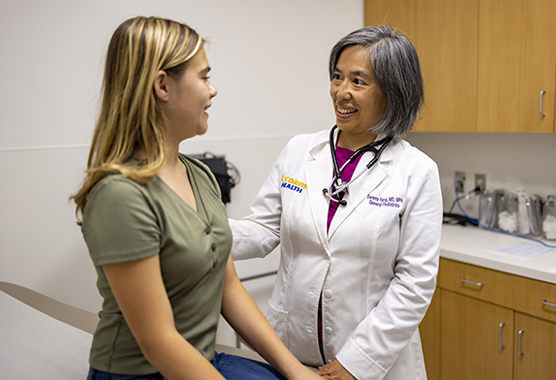Adolescent Gynecology
We offer state-of-the-art, compassionate care for the gynecological concerns of adolescents and young adults.
Medically reviewed by Melissa Chen, M.D. on Aug. 17, 2023.

What Is Adolescent Gynecology?
Gynecology covers health issues in reproductive organs such as the uterus or ovaries. Adolescent gynecology focuses on reproductive health care from puberty to age 19.
During this stage of physical development, it is common for youths to have questions and concerns about changes in their bodies. Many of the gynecologic conditions that affect adults can begin in adolescence.
UC Davis Health’s Department of Obstetrics and Gynecology (OB-GYN) is nationally recognized for excellent care. Our providers understand the unique needs of adolescents and young adults.
Symptoms of Adolescent Gynecologic Conditions
Adolescents can experience a range of gynecologic symptoms as their bodies develop. It’s important to discuss any new or changing symptoms with your provider. Early detection and treatment can protect your child’s health.
Common Symptoms
Possible signs of a gynecologic condition include:
- Abnormal vaginal discharge
- Bleeding or spotting between periods
- Heavy bleeding during periods
- Irregular periods
- Painful periods and cramping
- Pelvic pain
- Swelling of the labia or vulva
Emergency Symptoms
Seek help immediately if you have any of the following:
- Excessive bleeding
- High fever
- Severe pelvic pain
Common Causes of Adolescent Gynecologic Concerns
Reproductive health concerns can happen at any age. During adolescence, physical changes associated with puberty can cause a range of gynecological conditions.
Endometriosis
Endometriosis is a condition where tissue that resembles the lining of your child’s uterus grows in other parts of their pelvic area. It can cause pelvic pain and heavy bleeding during menstrual periods.
Fluctuating Hormones
Your child’s hormones can fluctuate (change inconsistently) at the beginning of puberty. Irregular periods are common for the first few years.
Polycystic Ovary Syndrome (PCOS)
PCOS is a condition triggered by abnormal hormone levels. It can lead to irregular ovulation and periods. PCOS is a common cause of infertility.
Prostaglandins
Chemicals called prostaglandins cause pain and cramping before and during your child’s period (dysmenorrhea). Their body makes prostaglandins in the lining of their uterus. Prostaglandins cause their uterus to contract, which leads to cramps.
Diagnosing Adolescent Gynecological Concerns
Our gynecology providers are highly trained in diagnosing reproductive health conditions in adolescents. We are compassionate and sensitive to their questions and concerns.
We will discuss your child’s symptoms and do an external visual exam to diagnose a gynecological condition. We may recommend a pelvic exam if your child’s symptoms include vaginal bleeding or discharge. We may also recommend a urine test to check for a urinary tract infection (UTI) or sexually transmitted infection (STI).
Adolescent Gynecology Treatments
UC Davis Health’s OB-GYNs offer a range of treatments for gynecologic conditions. We’ll create an individualized treatment plan for your child. Treatment for adolescent gynecologic issues depends on the condition. Our treatment options include:
Hormonal Contraceptives
Hormonal contraceptives (such as birth control pills) that contain a progestin or a combination of an estrogen and progestin can treat symptoms of irregular periods, PCOS and endometriosis.
At what age should girls first visit a gynecologist?
13-15Years old is the recommended age
Source: The American College of Obstetricians and Gynecologists: The Initial Reproductive Health Visit
Request an Appointment
As Sacramento's No. 1 hospital, you'll benefit from unique advantages in primary care and specialty care. This includes prevention, diagnosis and treatment options from experts in 150 specialties.
Referring Physicians
To refer a patient, submit an electronic referral form or call.
800-4-UCDAVIS
Patients
Call to make an appointment.
Consumer Resource Center
800-2-UCDAVIS

Ranked among the nation’s best hospitals
A U.S. News & World Report best hospital in cardiology, heart & vascular surgery, diabetes & endocrinology, ENT, geriatrics, neurology & neurosurgery, and pulmonology & lung surgery.

Ranked among the nation’s best children’s hospitals
U.S. News & World Report ranked UC Davis Children’s Hospital among the best in pediatric nephrology, orthopedics*, and pulmonology & lung surgery. (*Together with Shriners Children’s Northern California)

Ranked Sacramento’s #1 hospital
Ranked Sacramento’s #1 hospital by U.S. News, and high-performing in aortic valve surgery, back surgery (spinal fusion), COPD, colon cancer surgery, diabetes, gynecological cancer surgery, heart arrhythmia, heart failure, kidney failure, leukemia, lymphoma & myeloma, lung cancer surgery, pacemaker implantation, pneumonia, prostate cancer surgery, stroke, TAVR, cancer, orthopedics, gastroenterology & GI surgery, and urology.

The nation’s highest nursing honor
UC Davis Medical Center has received Magnet® recognition, the nation’s highest honor for nursing excellence.

World-class cancer care
One of ~59 U.S. cancer centers designated “comprehensive” by the National Cancer Institute.

A leader in health care equality
For the 13th consecutive year, UC Davis Medical Center has been recognized as an LGBTQ+ Healthcare Equality Leader by the educational arm of America’s largest civil rights organization.

